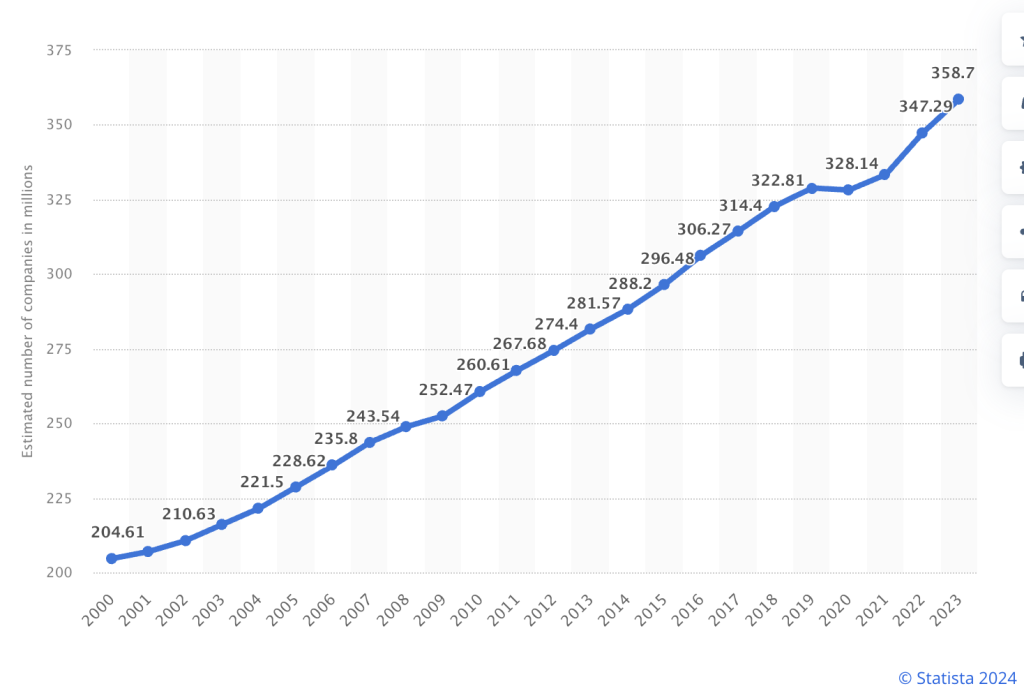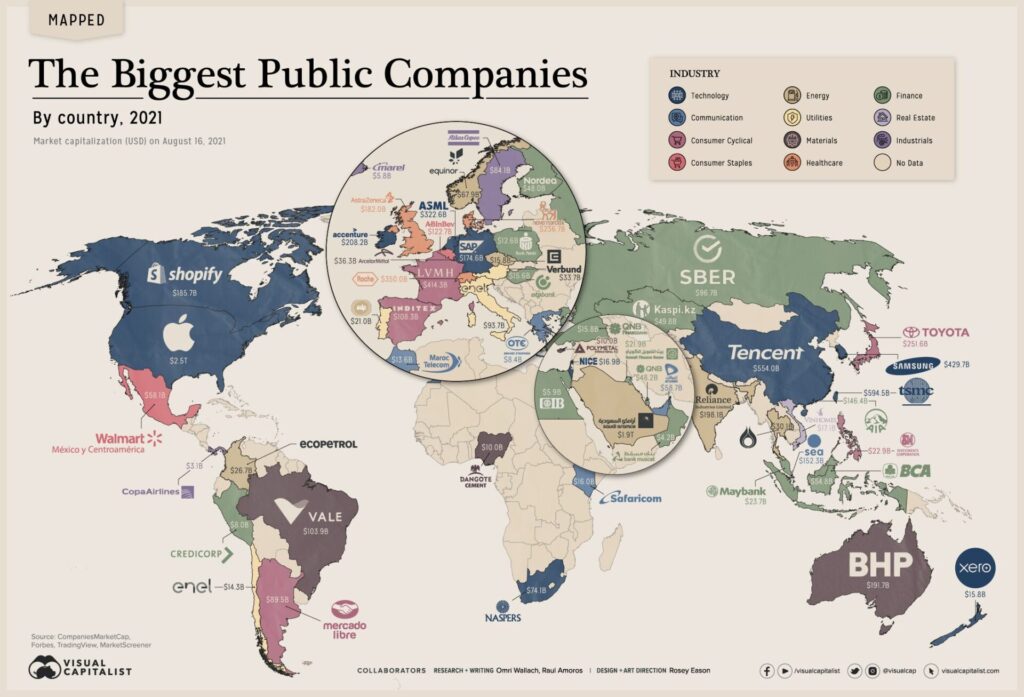As of 2023, there were approximately 359 million companies worldwide. This number includes a wide range of businesses, from small local enterprises to large multinational corporations. This number includes businesses of all sizes, from small sole proprietorships to large multinational corporations.
Number of Enterprises
As of 2023, there were approximately 359 million companies worldwide. This number includes a wide range of businesses, from small local enterprises to large multinational corporations. This number includes businesses of all sizes, from small sole proprietorships to large multinational corporations.
The global business landscape is dynamic and constantly evolving. Key trends include digital transformation, with increasing adoption of digital technologies across all sectors. There is also a growing emphasis on sustainability, with businesses focusing on sustainable practices and green technologies. Globalization continues to drive the expansion of companies into international markets. Innovation remains a key driver, particularly in fields like artificial intelligence, biotechnology, and renewable energy.

In summary, the number of companies worldwide reflects the dynamic and evolving global economy. From small local businesses to large multinational corporations, each plays a vital role in economic growth and development. The future looks promising, with ongoing advancements in technology, sustainability, and globalization shaping the business landscape. The number of corporations is increasing every year, based on the “Statista” report.
Micro-enterprises
Micro-enterprises are 90% more in the range of the corporations. They account for the overwhelming majority of businesses worldwide. These are often family-run or very small-scale operations. (Fewer than 10 employees)
Small enterprises
Small enterprises are 5-8% of the corporate range. Businesses play an important role in local economies.(10 to 49 employees)
Medium-sized enterprises
Medium-sized enterprises make up 1-2% of the corporate range. Increasingly significant players with higher employment and economic impact(50 to 249 employees)
Large enterprises
Large enterprises are less than 1%. Relatively small in number, but command significant economic resources.(250 or more employees)
Companies in each country
Asia
Asia is home to a significant portion of the world’s companies, driven by the economic powerhouses of China, India, and Japan. In 2023, there were an estimated 225,000 large companies (those with 250+ employees) operating in Asia1. The region’s rapid economic growth, large population, and increasing urbanization contribute to the high number of businesses. Key sectors include manufacturing, technology, and services.
North America
North America, particularly the United States and Canada, hosts many of the world’s largest and most innovative companies. In 2023, there were over 41,000 large companies in this region1. The U.S. is known for its strong technology sector, with Silicon Valley being a global hub for tech startups and giants alike. Other important industries include finance, healthcare, and manufacturing.
Europe
Europe has a robust business environment with a mix of small and medium-sized enterprises (SMEs) and large corporations. In 2023, Europe had around 83,000 large companies1. The region is known for its diverse economy, strong regulatory framework, and emphasis on sustainability. Key industries include automotive, pharmaceuticals, and financial services.
Latin America
Latin America has a growing number of companies, particularly in Brazil, Mexico, and Argentina. The region’s economy is diverse, with significant contributions from agriculture, mining, and manufacturing. While the number of large companies is smaller compared to Asia, North America, and Europe, SMEs play a crucial role in the region’s economic landscape.
Africa
Africa’s business environment is rapidly evolving, with increasing numbers of startups and SMEs. Key sectors include agriculture, mining, and telecommunications. While the number of large companies is relatively low, the continent’s young population and growing middle class present significant opportunities for business growth.
Oceania
Oceania, including Australia and New Zealand, has a smaller number of companies compared to other regions. However, the region is known for its strong economy and high standard of living. Key industries include mining, agriculture, and services. Australia, in particular, has a significant number of large companies operating in these sectors.
Companies Industry
Each of these industries has its unique challenges and opportunities, contributing to the overall economic landscape. If there’s a specific industry you’re particularly interested in, feel free to ask for more details!
Technology
The technology sector is one of the fastest-growing industries globally. It includes companies involved in software development, hardware manufacturing, IT services, and telecommunications. Major players like Apple, Microsoft, and Google dominate this sector. The rise of artificial intelligence, cloud computing, and cybersecurity has further fueled growth.
Finance
The finance industry encompasses banks, investment firms, insurance companies, and real estate businesses. This sector is vital for economic stability and growth, providing essential services like loans, investments, and risk management. Major financial hubs include New York, London, and Tokyo.
Manufacturing
Manufacturing remains a cornerstone of the global economy, producing goods ranging from automobiles to electronics. This industry is characterized by large-scale production and significant employment. Key regions include China, the United States, and Germany, known for their robust manufacturing capabilities.
Healthcare
The healthcare industry includes pharmaceuticals, biotechnology, medical devices, and healthcare services. This sector has seen substantial growth, especially with advancements in medical technology and an aging global population. Companies like Pfizer, Johnson & Johnson, and Novartis are leaders in this field.
Retail
Retail is a diverse industry that includes everything from small local shops to large multinational chains. E-commerce has revolutionized this sector, with companies like Amazon and Alibaba leading the way. The retail industry is crucial for consumer goods distribution and economic activity.
Energy
The energy sector includes oil and gas, renewable energy, and utilities. This industry is essential for powering economies and supporting infrastructure. There is a growing shift towards renewable energy sources like solar and wind, driven by environmental concerns and technological advancements.
Transportation and Logistics
This industry covers the movement of goods and people, including shipping, airlines, railways, and logistics services. Companies like FedEx, UPS, and Maersk are key players. The industry is critical for global trade and supply chain management.
Construction
The construction industry involves building infrastructure, residential, and commercial properties. It is a significant employer and a driver of economic development. Major construction firms operate globally, contributing to urbanization and development projects.
Agriculture
Agriculture includes farming, livestock, and agribusiness. This industry is fundamental for food production and supply. Technological advancements in agriculture, such as precision farming and biotechnology, are enhancing productivity and sustainability.
Entertainment and Media
This sector includes film, television, music, publishing, and digital media. It is a dynamic industry driven by content creation and distribution. Companies like Disney, Netflix, and Warner Bros. are prominent in this space.
SASAL, INC Support
SASAL, INC is a New York Stock Exchange-listed corporation that shares information. Please feel free to check it out. This is SASAL, INC’s SNS Information.





